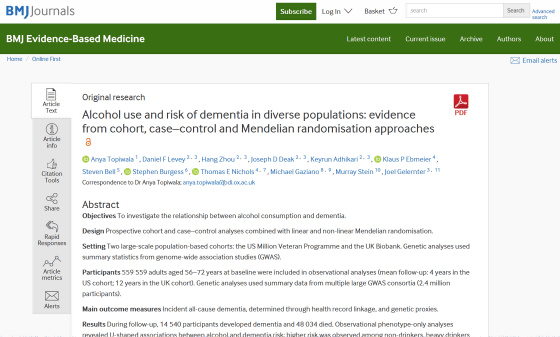Research results show that even small amounts of alcohol may increase the risk of dementia

In recent years,
Alcohol use and risk of dementia in diverse populations: evidence from cohort, case–control and Mendelian randomization approaches | BMJ Evidence-Based Medicine
https://ebm.bmj.com/content/early/2025/09/16/bmjebm-2025-113913

There May Be No Safe Amount of Booze When It Comes to Dementia Risk : ScienceAlert
https://www.sciencealert.com/there-may-be-no-safe-amount-of-booze-when-it-comes-to-dementia-risk
The international research team surveyed 559,559 adults aged 56 to 72 living in the UK and the US at the start of the study. Participants completed a questionnaire about their drinking habits and were then tracked for up to 15 years regarding their health.
During the follow-up period, 14,540 participants developed dementia and 48,034 died. The average follow-up period for participants in the UK was 12 years, while that for participants in the US was 4 years.

When the data was analyzed, a typical U-shaped graph was obtained, showing that 'non-drinkers and heavy drinkers have a high risk of dementia, while moderate drinkers have the lowest risk of dementia.' This result seems to suggest that 'moderate drinking reduces the risk of dementia,' but the research team points out that there is actually a pitfall in this graph.
According to the research team, the participants who answered that they never drank alcohol included those who were once heavy drinkers but stopped drinking for some reason, and those who stopped drinking because they experienced the early symptoms of dementia. In other words, the statistics were skewed.
To find further evidence, the research team used
The graph below shows the predicted alcohol consumption (horizontal axis) and dementia risk (vertical axis) by Mendelian randomization analysis. The higher the predicted alcohol consumption, the higher the dementia risk, and even small amounts of alcohol consumption did not reduce the risk.

The research team said: 'Our findings confirm that all types of alcohol consumption have a detrimental effect on dementia risk. There is no evidence to support the previously suggested protective effect of moderate drinking.' 'Reducing the prevalence of alcohol use disorders could potentially reduce dementia cases by up to 16%. This highlights that reducing alcohol intake is a potential strategy for dementia prevention policy.'
This study has several limitations. First, the data on participants' drinking habits was self-reported, not scientifically measured, which may lead to inaccuracies. Second, while Mendelian randomization analysis is a useful tool, it does not directly record alcohol intake.
Tara Spiers-Jones, a neuroscientist at the University of Edinburgh who was not involved in the new study, said: 'Neither part of this study can conclusively prove that alcohol consumption directly causes dementia, but it adds to a large body of similar data showing an association between alcohol consumption and an increased risk of dementia. Basic neuroscience research shows that alcohol is directly toxic to neurons in the brain.'
Related Posts:
in Science, Food, Free Member, Posted by log1h_ik







